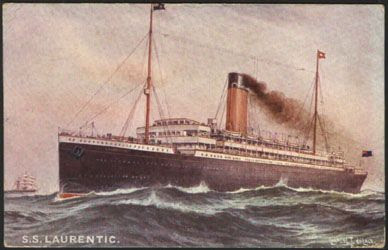Louisa Ellen Wright
Grandma impressed me as a person of great inward strength and courage. She had seen both poverty and wealth. In England, she worked as a servant for some wealthy families, one was named Stokes. Lady Stokes entertained royalty from other countries - with their fine clothes and all their jewelry. The ladies often wore heavy silk dresses, so stiff that the dresses could probably stand up even if no one was wearing them. They also wore necklaces of diamonds or pearls. The gentlemen were elegantly dressed as well, with diamond cufflinks, tie pins, etc. Louisa worked in the kitchen, but the girls who served the tables would leave the door open a crack so that the kitchen help (like Louisa) could enjoy the spectacle too. The milk delivery man would call “Milko, Milko” as he approached the house. This was good until the parrot learned to imitate his call, sending the cooks on many false errands. Then he’d laugh at them!
Louisa was engaged to marry Wally, a merchant sailor on the "Montezuma" and the future looked good. But on his last voyage before their marriage, he was drowned when the boat capsized while returning to the ship one night. It has been speculated that the sailors had been too boisterous, leading to the tragedy, but we do not know. Apparently Wally’s body was never found, just his cap with his name in it. He had signed everything over to Louisa because of their impending marriage, but she refused to accept it, sending everything to his widowed mother. Louisa had an oil painting of the Montezuma, which she kept throughout her life and I later inherited it.
Louisa’s life had been turned upside down by this tragedy, but life goes on. Later, someone suggested that she write to Richard Ing, a young single man they knew, who had moved to Canada as a boy, about 15 years previously, and who had sent money for passage to Canada to his mother and his sister just a few years previously. “Dick” and “Lou” wrote letters back and forth, and finally he proposed, asking her to come to Canada and marry him.
On her trip to Canada, the Salvation Army band on shore played "God be with you 'til we meet again", as the ship left port. They could hear it far out to sea. When the band on the ship asked for requests, one of the porters always requested "Where Is My Wandering Boy Tonight?", thinking of his missing son. On the ship she looked after a little girl named Dorothy [Wilson], who was traveling to Canada. Louisa’s daughter Dorothy was named after her. One day little Dorothy was skipping on the deck, when her shoe flew off her foot and into the ocean.
She was a passenger on the White Star Line’s Laurentic, Tonnage: 9254, Total adult passengers: 1543, Leaving Liverpool, June 24th 1913, to Quebec. (The Titanic disaster was probably on the minds of many.)
The passenger manifest of the RMS Laurentic describes her as: Wright, Louisa age 28; travelling with the Salvation Army group; Single; To be married to R. Ing, Wilhelmina, Alta; Born in England, English; Landing in Montreal, Que; Employed as a Maid in UK and as a Maid in Canada; Religion: Church of England; Travelling from port by Canadian Pacific Railway.
Richard knew when Louisa should arrive at the closest railway station, which was at Macklin, Saskatchewan, and travelled there with friends from Kirriemuir, Alberta, to be ready to meet his bride and get married. But the railway journey from Montreal ran into a problem. Somewhere north of Lake Superior, a landslide had blocked the railway tracks. It took several hours to clear the tracks so that the train could continue its journey. As a result, it was almost midnight when the train arrived at Macklin, and so Louisa and Richard were married at the minister’s house at midnight. Louisa was horrified to discover that the trunk holding her wedding dress could not be found, so she was married in the dress that she was travelling in.
During the night they were awakened by the sound of shouting and pounding on the roof. “It’s the Indians, isn’t it?”, she asked anxiously, expecting to be scalped any minute. Richard laughed. “No it is probably just my friends.” He was right, of course. Friends had come to celebrate the wedding.
The next day, they made the trip to Richard’s homestead cabin. This was a much humbler place to work than the mansions where she had served in England. But this small framed-lumber house was hers. And some neighborhood homes were sod cabins or dug-outs, so a framed lumber house looked very good in comparison.
Richard’s brother James Ing’s family lived nearby. When Louisa first visited them, Jim’s wife Jane was in the garden on her hand and knees with her face in a row of vegetables. “Whatever is Jane doing?”, she asked. “Her eyesight is very poor, and she is weeding her garden”, he explained. Aunty Jane soon became completely blind, but she continued to do nearly all of her household tasks except for taking the bread out of the oven. Uncle Jim looked after this. The two families remained very close, so that as the children grew up the cousins were almost like siblings.
Richard loved to tease. Jim’s children were favorite targets. They were in a quandry, “What will we do if Aunty Lou can’t stand his teasing and decides to go back to England?” They discussed it and decided “We will still call her Aunty Lou!” They did not need to worry. Louisa was there to stay. They had a wonderful marriage full of love and laughter. Their children said that they could not remember either parent spanking any of the children.
Times were difficult. They lived in one of the areas hardest hit by drought. In fact they moved in the 1920s to avoid the drought, only to be overtaken by the drought again and again. Finally they moved to the Norbuck area in the late 1930s, where they farmed until their retirement to Breton about 1948.
They saw their two sons and two of their sons-in-law join the army to fight in World War 2. They had no way of knowing that all four would return safely, but we thank God that they did.
I remember as a young child, visiting them on their farm. There was a frame house and a log house. Used 22 shells had been pounded into the ends of some of the logs to spell out initials. I thought that was very clever. Grandma kept milk cold in a pan sitting in a small creek that flowed through the farm. And they had a 3-legged dog that had lost a leg in an accident, but could still run and play.
The house in Breton was a frame house that had a living room, kitchen/dining room, bedroom and guests room. Both houses had the Montezuma painting and the old mantle clock. And on the wall, were words from the patriotic song, “There Will Always Be an England.”
There'll always be an England
While there's a country lane,
Wherever there's a cottage small
Beside a field of grain.
There'll always be an England
While there's a busy street,
Wherever there's a turning wheel,
A million marching feet. …
There'll always be an England,
And England shall be free
If England means as much to you
As England means to me.
Louisa believed in the importance of daily prayers, and her bedtime prayer was usually
“Now I lay me down to sleep.
I pray the Lord my soul to keep.
If I should die before I wake,
I pray the Lord my soul to take.”
She taught this prayer to me, and when she was in her 90s I found her offering this same prayer.
Louisa loved to sing, and she sang constantly throughout the day as she did her work. Even when she was down on her knees scrubbing the floor she would be singing. She often sang the hymns "I Need Thee Every Hour" and "Will There Be Any Stars in My Crown?"
She set a powerful example, in my opinion.
Obituary
On Jan. 26, 1986, Louisa Ellen Ing of Wetaskiwin passed away at the age of 101 years. Louisa Ing was born in London, England, December 12, 1884, came to Canada in 1913 and married Richard Ing. The first 12 years of their marriage they lived on the prairie in the Kirriemuir district moving to Breton and Wetaskiwin in the later years. She spent ten years in Stony Plain Nursing Home, coming to Wetaskiwin Auxiliary Hospital last April.
In her younger years she was an avid gardener and loved to grow flowers. She loved to sing, especially the old country songs which she sang until just a few months ago. She enjoyed her family and on her 100th birthday had a party with all her family there. She leaves to mourn her loss her loving family Marion of Wetaskiwin, Walter of Breton, Charlie of Breton, Dorothy of Breton, Violet of Winfield and Myrtle of Clive, 18 grandchildren, 31 great grandchildren and six great great grandchildren. She was predeceased by her husband Richard in 1967 and two grandsons.





0 Comments:
Post a Comment
<< Home